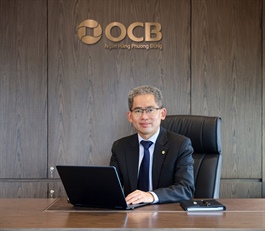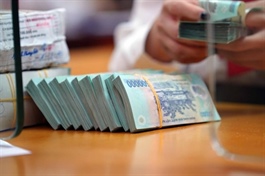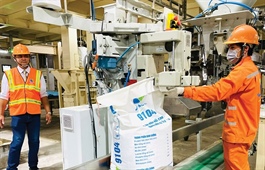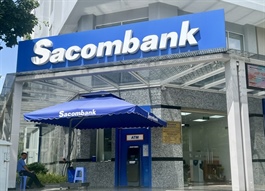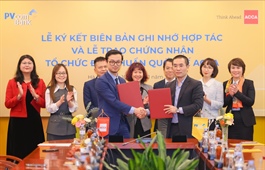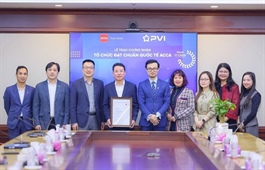Ensuring credit growth for robust economic development
Ensuring credit growth for robust economic development
Encouraging economic development through the banking system by boosting credit growth has been a consistent directive from the government and the State Bank of Vietnam (SBV) in recent times. Phung Thi Binh, deputy general director of Agribank – one of Vietnam's leading state-owned banks – spoke with VIR’s Hong Dung about this issue.

Phung Thi Binh, deputy general director of Agribank |
In 2024, a key directive from the government for the banking system was to reduce lending rates to support business production. Could you explain how Agribank implemented interest rate reductions in 2024?
Agribank's credit supply to the market currently exceeds VND1.7 quadrillion ($70.83 billion), with nearly 65 per cent of outstanding loan balances directed toward agriculture, rural areas, and farmers.
The bank continues to prioritise investment in these sectors, striving to bolster the value of Vietnamese agricultural products. Priority is given to agricultural products in value chains that meet international standards and sustainable development trends, requiring consistent production within value chains rather than fragmented efforts as before.
As a pivotal state-owned commercial bank, Agribank implemented comprehensive measures to reduce lending rates in 2024. This significant effort aimed to stimulate economic development, promptly meet capital needs for production and business activities, and support citizens and businesses in overcoming challenges.
This policy reflects a consistent alignment with the government and SBV's directives. Agribank has adjusted lending rate floors four times, reducing rates from 1-2.5 per cent per year – significantly higher than the reduction in deposit rates. In 2024, Agribank's average lending rate decreased by approximately 1.5 per cent compared to the beginning of the year, a sharper decline than the banking system's average rate reduction of 0.96 per cent per year.
Agribank intensified lending to export-import businesses last year. What motivated Agribank to increase credit in this sector?
Exports are one of the five priority investment sectors according to the Party and state's directives, particularly for agricultural product export businesses, including rice, fruit, forestry, and seafood. Our bank has enhanced preferential credit policies to effectively expedite lending schemes within closed value chains in agricultural production, thereby increasing the value of Vietnam's agricultural production.
For example, Agribank initially registered $125 million for the SBV's $1.25 billion preferential credit package for forestry and aquatic loans, which has now expanded to $542 million. In parallel, Agribank launched a $830 million lending plan for export-import customers in 2024.
From the outset of 2025, Agribank has nearly doubled its support for production and business activities in the export-import sector, offering $1.46 billion in short-term preferential loans with interest rates up to 1.6 per cent per year lower than regular lending rates, along with various deposit, service fee, and foreign exchange rate incentives. Companies maintaining deposit balances in USD can enjoy lending rates in Vietnam VND from as low as 2.4 per cent per year.
Social housing and old apartment renovation programmes under government Resolution 33/NQ-CP have seen slow progress, but have started to gain momentum. What is your assessment, and can you provide some updates on Agribank's implementation of Resolution 33?
Legal bottlenecks have been gradually removed by local authorities from the fourth quarter of 2024. Many developers reported that legal documents, which previously took six months to resolve, are now being processed within two months.
With the proactive involvement of local authorities in addressing legal obstacles, I believe that lending for social housing projects will become more favourable.
On January 3, the SBV issued Dispatch No. 55/NHNN-TD applicable to commercial banks regarding their implementation of social housing, worker housing, and old apartment renovation lending programmes under Resolution 33.
In light of this document, commercial banks are not required to calculate loans tailored to beneficiaries into their annual credit growth targets. This policy facilitates banks in allocating resources to critical credit programmes in line with the Party and state's directives.
Agribank has registered to participate in social housing, worker housing, and old apartment renovation loan initiatives with a credit scale reaching $1.25 billion over ten years.
By December 31, 2024, Agribank had provided credit to 13 real estate developers and nearly 300 individual customers for house purchases. The total credit volume our bank has provided amounts to $166.6 million, with outstanding balances exceeding $41.5 million. Currently, Agribank is evaluating and considering credit provision for five projects, with a total projected credit issuance approximating $125 million.
Since the end of 2024, the SBV has issued directives to boost credit growth for 2025. What action has Agribank taken in response to these strong moves from the regulator?
Agribank will be allowed to expand its credit by approximately VND220 trillion ($9.16 billion) this year. Given the strong economic growth forecast for Vietnam in 2025 and the government's GDP growth target at 8 per cent, I believe that credit growth will enjoy more favourable conditions.
Following the government's directives, the SBV has aggressively implemented measures to ease difficulties and enhance access to capital for citizens and businesses, while promoting credit growth.
From the outset of 2025, our bank has launched numerous preferential interest rate credit packages for both corporate and individual customers. For corporate customers, Agribank has allocated more than $8.75 billion in preferential capital, coupled with various incentives related to deposit rates, service fees, and foreign exchange rates, effective from January 1 to December 31.
For individual customers, Agribank is also implementing preferential credit packages with a total scale exceeding $4.58 billion, aimed at supporting consumer loans for living needs, production and business loans, and green credit initiatives.





